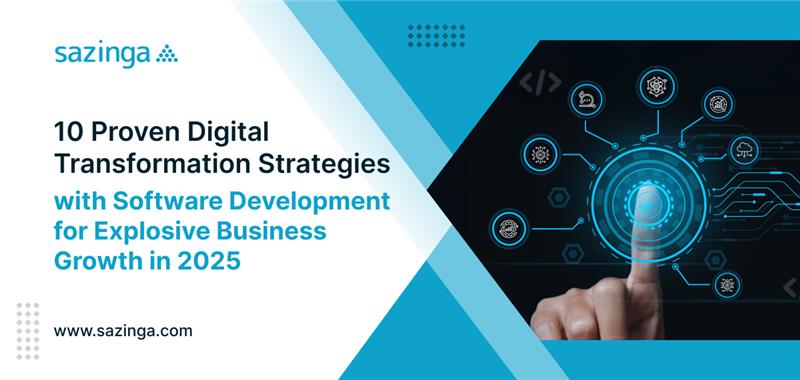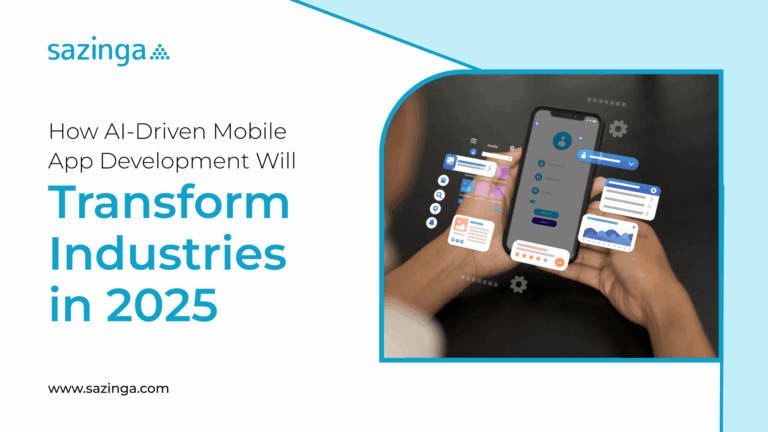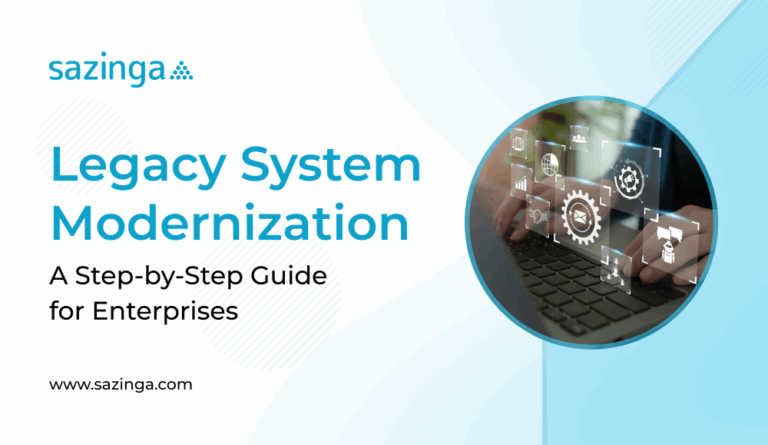10 Proven Digital Transformation Strategies with Software Development for Explosive Business Growth in 2025
Digital transformation is changing how businesses work. It helps companies improve efficiency, reduce costs, and offer better services. Businesses that do not adapt risk falling behind.
Digital transformation strategies use modern technology to improve operations. Software development plays a key role in these strategies. Companies need custom software solutions to address unique business challenges.
Investment in digital transformation is rising fast. By 2025, companies will spend over $8.5 trillion on digital projects. More than 55% of global GDP will come from businesses that have adopted digital tools.
1. AI-Driven IT Operations (AIOps) and Automation
AI and ML are changing business operations. They help automate complex tasks and improve decision-making. AIOps is an AI-powered approach to IT operations. It helps businesses monitor and manage systems in real-time. AI can detect system issues before they cause major failures.
Companies using AI can reduce downtime and increase efficiency. AI-powered automation is also improving customer service. Chatbots and virtual assistants are replacing traditional support teams.
Industries such as healthcare, finance, and retail are seeing big benefits. AI can analyze large data sets to predict trends and customer behavior. Businesses that integrate AI into their digital transformation strategies can work smarter and faster.
2. Generative AI for Enhanced Customer Engagement
Generative AI is revolutionizing content creation and customer interactions. It can create text, images, and even videos. Businesses are using it for marketing, customer support, and product design.
Chatbots powered by Generative AI can handle customer queries efficiently. AI-driven assistants can offer custom software solutions for personalized recommendations. This improves customer experience and boosts sales. E-commerce platforms use AI to generate product descriptions and reviews. AI can also create social media content, saving time for marketing teams.
AI-powered tools help businesses understand customer preferences. They analyze behavior patterns and predict future needs. Companies using AI in their digital transformation strategies will deliver more personalized experiences.
3. Quantum Computing for Next-Level Processing Power
Quantum computing is a game-changer for industries needing fast data processing. It uses quantum bits (qubits) instead of traditional binary code. This makes computing faster and more powerful.
Financial firms use quantum computing for risk analysis. Healthcare companies use it for drug discovery and disease prediction. Logistics businesses use it to optimize delivery routes.
Quantum computing can solve problems that traditional computers cannot handle. It enables better simulations, cybersecurity, and optimization solutions. Quantum computing is still developing. Businesses should start exploring how it fits into their digital transformation strategies now. Early adoption will give companies a competitive advantage.
4. Cloud-Native Architectures for Scalability and Agility
Cloud computing is the backbone of digital transformation. It allows businesses to scale operations without heavy infrastructure costs. Companies are shifting to cloud-native platforms. These platforms offer flexibility, speed, and cost savings. Software development in the cloud is faster and more secure.
Cloud-based custom software solutions help businesses adapt to market changes. They provide real-time access to data and enable remote collaboration. Cloud computing also improves disaster recovery. Companies can store data in multiple locations, reducing the risk of data loss.
Businesses that embrace cloud computing will gain agility. Their digital transformation strategies will be more efficient and cost-effective.
5. Customer Experience (CX) Optimization with Digital Solutions
Customer experience is key to business success. Digital tools help companies offer personalized services.
AI-driven chatbots improve customer support. Predictive analytics help businesses understand customer needs. Personalization engines recommend products based on user behavior. Custom software solutions play a big role in improving CX. Businesses can create apps tailored to their customers’ needs. This improves engagement and brand loyalty.
Omnichannel strategies integrate websites, mobile apps, and social media. Customers get a seamless experience across all platforms.
Companies investing in CX optimization will see higher customer retention. Strong CX is a vital part of digital transformation strategies in 2025.
6. Process Optimization Through Custom Software Solutions
Efficient processes save time and money. Businesses need automation to remove inefficiencies. Enterprise Resource Planning and Customer Relationship Management systems help companies manage operations better. Robotic Process Automation handles repetitive tasks.
Custom software solutions allow businesses to develop tools that fit their needs. Off-the-shelf software cannot always address unique challenges.
For example, logistics companies use custom software solutions to track shipments in real-time. Retailers use them to manage inventory and predict demand.
Process optimization leads to faster decision-making. It also improves workflow automation. Businesses adopting these tools in their digital transformation strategies will stay ahead.
7. Data-Driven Decision-Making with Advanced Analytics
Data is one of the most valuable business assets. Companies that use analytics can make smarter decisions.
Predictive analytics helps businesses forecast trends. AI-driven insights provide real-time business intelligence. Companies can adjust strategies based on data analysis. Retailers use data analytics to optimize pricing strategies. Healthcare firms use it for patient diagnostics. Financial firms use it to detect fraud.
Software development enables companies to build data dashboards. These dashboards track performance metrics in real-time. By integrating analytics into their digital transformation strategies, businesses improve efficiency. They also gain a better understanding of customer needs.
8. Agile Software Development for Rapid Innovation
Agile methods allow businesses to adapt to changing market conditions. Traditional software development is slow and rigid. Agile development focuses on speed and flexibility. Agile teams work in short development cycles, called sprints. They continuously test and improve the software.
DevOps practices support Agile development. Custom software solutions are deployed faster using Continuous Integration/Continuous Deployment (CI/CD) pipelines.
Companies using Agile can quickly respond to customer needs. They can launch new features faster. This makes Agile a key part of digital transformation strategies. Businesses that adopt Agile software development will remain competitive in 2025.
9. Cybersecurity-First Development Approach
Cyber threats are increasing. Businesses must make security a priority. A cybersecurity-first approach integrates security into software development from the start. AI-powered security tools detect and prevent cyberattacks.
Zero-trust security ensures strict authentication for all users. Data encryption protects sensitive information. Businesses also need to follow regulations such as GDPR and CCPA. Compliance protects companies from legal risks.
Cybersecurity should be part of every digital transformation strategy. Without strong security, businesses risk losing customer trust.
10. Workforce Digital Upskilling and Change Management
Digital transformation is not just about technology. It also requires a skilled workforce.
Companies must train employees to use new digital tools. Online courses and virtual training programs help workers develop new skills. A change in management strategies ensure smooth transitions. Employees must understand the benefits of digital transformation.
Software development training helps teams build innovative solutions. Companies investing in workforce upskilling will see higher productivity. A well-trained workforce is key to successful digital transformation strategies. Businesses must prioritize employee education in 2025.
In conclusion,
Digital transformation is no longer optional. Companies must adopt modern technologies to stay competitive. The ten digital transformation strategies discussed in this blog offer a roadmap for success. Businesses must integrate AI, cloud computing, and data analytics into their operations.
Software development is the foundation of these strategies. Companies need custom software solutions to optimize processes and enhance customer experiences. Cybersecurity, Agile methodologies, and workforce training are also essential. A well-rounded approach will ensure long-term success.
Businesses that invest in digital transformation will see rapid growth in 2025. The future belongs to companies that embrace change and innovation.







